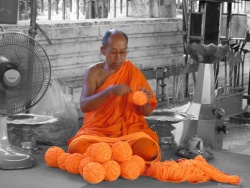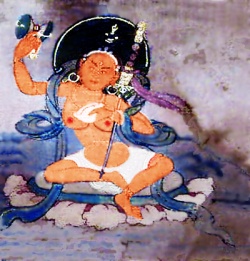Difference between revisions of "The Theragatha Verses"
| Line 1: | Line 1: | ||
{{DisplayImages|153|754|1616|1807}} | {{DisplayImages|153|754|1616|1807}} | ||
| + | |||
| + | |||
| + | |||
| + | |||
| + | |||
| + | |||
| + | |||
| + | |||
<poem> | <poem> | ||
| − | The [[Theragatha]], the verses of the {{Wiki|ancient}} [[elders]], includes eight verses ascribed to the [[Venerable]] [[Maha Kaccana]] (vv.494-501). These verses are in no way [[exceptional]] and merely express, in verse [[form]], injunctions to proper [[discipline]] for [[monks]] and practical advice for householders. Although [[Maha Kaccana's]] verses addressed to the [[brahman]] Lohicca did serve effectively as a {{Wiki|didactic}} tool, he does not seem to have been as amply endowed with the [[gift]] of poetic expression as several of the other great [[disciples]], such as [[Maha Kassapa]], [[Sariputta]], and [[Vangisa]]. His [[sphere]] of [[excellence]] was analysis and {{Wiki|exegesis}}, not inspirational [[eloquence]] or artistic creativity. | + | The [[Theragatha]], the verses of the {{Wiki|ancient}} [[elders]], includes eight verses ascribed to the [[Venerable]] [[Maha Kaccana]] (vv.494-501). These verses are in no way [[exceptional]] and merely express, in verse [[form]], injunctions to proper [[discipline]] for [[monks]] and [[practical advice]] for householders. Although [[Maha Kaccana's]] verses addressed to the [[brahman]] [[Lohicca]] did serve effectively as a {{Wiki|didactic}} tool, he does not seem to have been as amply endowed with the [[gift]] of {{Wiki|poetic}} expression as several of the other great [[disciples]], such as [[Maha Kassapa]], [[Sariputta]], and [[Vangisa]]. His [[sphere]] of [[excellence]] was analysis and {{Wiki|exegesis}}, not inspirational [[eloquence]] or artistic {{Wiki|creativity}}. |
The first two verses (vv.494-95), according to the commentary, were spoken as an exhortation to the [[bhikkhus]]. One day the elder had noticed that a number of [[monks]] had laid aside their [[meditation]] practice in order to [[delight]] in work and in company. They were also growing too fond of the delicious [[food]] provided by their devoted lay supporters. He therefore admonished them thus:[23] | The first two verses (vv.494-95), according to the commentary, were spoken as an exhortation to the [[bhikkhus]]. One day the elder had noticed that a number of [[monks]] had laid aside their [[meditation]] practice in order to [[delight]] in work and in company. They were also growing too fond of the delicious [[food]] provided by their devoted lay supporters. He therefore admonished them thus:[23] | ||
| Line 8: | Line 16: | ||
One should avoid [[people]], | One should avoid [[people]], | ||
One should not bustle (to obtain gifts). | One should not bustle (to obtain gifts). | ||
| − | One who is eager and [[greedy]] for flavors | + | One who is eager and [[greedy]] for [[flavors]] |
Misses the goal that entails [[happiness]]. | Misses the goal that entails [[happiness]]. | ||
| Line 16: | Line 24: | ||
{{Wiki|Honor}} is hard for a vile man to discard." | {{Wiki|Honor}} is hard for a vile man to discard." | ||
| − | The other six verses, again according to the commentary, were spoken as exhortations to [[King]] [[Candappajjota]]. The [[king]], it is said, placed [[faith]] in the [[brahmans]] and at their behest performed [[animal]] sacrifices; he also would impose penalties and confer favors {{Wiki|arbitrarily}}, presumably on account of that impulsive {{Wiki|temperament}} of his that earned him the title "the Violent." Therefore, to dissuade the [[king]] from such reckless {{Wiki|behavior}}, the elder recited the next four verses (496-99): | + | The other six verses, again according to the commentary, were spoken as exhortations to [[King]] [[Candappajjota]]. The [[king]], it is said, placed [[faith]] in the [[brahmans]] and at their behest performed [[animal]] [[sacrifices]]; he also would impose penalties and confer favors {{Wiki|arbitrarily}}, presumably on account of that impulsive {{Wiki|temperament}} of his that earned him the title "the [[Violent]]." Therefore, to dissuade the [[king]] from such reckless {{Wiki|behavior}}, the elder recited the next four verses (496-99): |
"It is not on account of another | "It is not on account of another | ||
That a mortal's [[kamma]] is [[evil]]. | That a mortal's [[kamma]] is [[evil]]. | ||
| − | On one's own accord one should not resort to [[evil]], | + | On one's [[own]] accord one should not resort to [[evil]], |
For {{Wiki|mortals}} have [[kamma]] as their kinsmen. | For {{Wiki|mortals}} have [[kamma]] as their kinsmen. | ||
| Line 45: | Line 53: | ||
Everything that is seen and heard. | Everything that is seen and heard. | ||
| − | One with [[eyes]] should be as if blind, | + | One with [[eyes]] should be as if [[blind]], |
One with {{Wiki|ears}} as if [[deaf]], | One with {{Wiki|ears}} as if [[deaf]], | ||
One with [[wisdom]] as if mute, | One with [[wisdom]] as if mute, | ||
One with strength as if feeble. | One with strength as if feeble. | ||
| − | Then, when the goal has been attained, | + | Then, when the goal has been [[attained]], |
One may lie upon one's [[death]] bed." | One may lie upon one's [[death]] bed." | ||
| − | The commentary explains the purport of the verses thus: A [[wise]] [[person]] should not reject everything, but should first investigate [[virtues]] and faults and then should reject whatever should be rejected and accept whatever is acceptable. Therefore, in regard to what should be rejected, though one possesses [[vision]] one should be as if blind, and though able to hear, one should be as if [[deaf]]. One who is {{Wiki|intelligent}}, able to speak well, should be as if dumb when tempted to speak what is unfit to be uttered; and one who is strong should be as if feeble in regard to what should not be done. | + | The commentary explains the purport of the verses thus: A [[wise]] [[person]] should not reject everything, but should first investigate [[virtues]] and faults and then should reject whatever should be rejected and accept whatever is acceptable. Therefore, in regard to what should be rejected, though one possesses [[vision]] one should be as if [[blind]], and though able to hear, one should be as if [[deaf]]. One who is {{Wiki|intelligent}}, able to speak well, should be as if dumb when tempted to speak what is unfit to be uttered; and one who is strong should be as if feeble in regard to what should not be done. |
| − | The last line is {{Wiki|ambiguous}}, in the [[Pali]] as well, and is interpreted in two different ways by the commentary: (1) When a task that should be done has arisen, one should investigate it and not neglect it even if one is lying on one's [[death]] bed. (2) Or alternatively, if a task that one should not do has arisen, one should prefer to [[die]] — to lie down on one's [[death]] bed — rather than do it. Neither explanation {{Wiki|sounds}} convincing, and the [[sense]] consonant with the [[spirit]] of the [[Theragatha]] as a whole would seem to be: One should [[die]] as one who has attained the goal, i.e., as an [[arahant]]. | + | The last line is {{Wiki|ambiguous}}, in the [[Pali]] as well, and is interpreted in two different ways by the commentary: (1) When a task that should be done has arisen, one should investigate it and not neglect it even if one is {{Wiki|lying}} on one's [[death]] bed. (2) Or alternatively, if a task that one should not do has arisen, one should prefer to [[die]] — to lie down on one's [[death]] bed — rather than do it. Neither explanation {{Wiki|sounds}} convincing, and the [[sense]] consonant with the [[spirit]] of the [[Theragatha]] as a whole would seem to be: One should [[die]] as one who has [[attained]] the goal, i.e., as an [[arahant]]. |
</poem> | </poem> | ||
{{R}} | {{R}} | ||
[http://www.accesstoinsight.org/lib/authors/bodhi/wheel405.html www.accesstoinsight.org] | [http://www.accesstoinsight.org/lib/authors/bodhi/wheel405.html www.accesstoinsight.org] | ||
[[Category:Maha Kaccana]] | [[Category:Maha Kaccana]] | ||
Latest revision as of 21:56, 10 February 2024
The Theragatha, the verses of the ancient elders, includes eight verses ascribed to the Venerable Maha Kaccana (vv.494-501). These verses are in no way exceptional and merely express, in verse form, injunctions to proper discipline for monks and practical advice for householders. Although Maha Kaccana's verses addressed to the brahman Lohicca did serve effectively as a didactic tool, he does not seem to have been as amply endowed with the gift of poetic expression as several of the other great disciples, such as Maha Kassapa, Sariputta, and Vangisa. His sphere of excellence was analysis and exegesis, not inspirational eloquence or artistic creativity.
The first two verses (vv.494-95), according to the commentary, were spoken as an exhortation to the bhikkhus. One day the elder had noticed that a number of monks had laid aside their meditation practice in order to delight in work and in company. They were also growing too fond of the delicious food provided by their devoted lay supporters. He therefore admonished them thus:[23]
"One should not do much work
One should avoid people,
One should not bustle (to obtain gifts).
One who is eager and greedy for flavors
Misses the goal that entails happiness.
They knew as a bog this homage and veneration
Obtained among devoted families.
A subtle dart, difficult to extract,
Honor is hard for a vile man to discard."
The other six verses, again according to the commentary, were spoken as exhortations to King Candappajjota. The king, it is said, placed faith in the brahmans and at their behest performed animal sacrifices; he also would impose penalties and confer favors arbitrarily, presumably on account of that impulsive temperament of his that earned him the title "the Violent." Therefore, to dissuade the king from such reckless behavior, the elder recited the next four verses (496-99):
"It is not on account of another
That a mortal's kamma is evil.
On one's own accord one should not resort to evil,
For mortals have kamma as their kinsmen.
One is not a thief by another's word,
One is not a sage by another's word;
It is as one knows oneself
That the devas also know one.
Others do not understand
That we all come to an end here.
But those wise ones who understand this
Thereby settle their quarrels.[24]
The wise man lives indeed
Even despite the loss of his wealth.
But if one does not obtain wisdom,
Then even though rich one is not alive."
The last two stanzas (500-501) were spoken by the elder when the king came to him one day and informed him of a disturbing dream he had seen the previous night:
"One hears all with the ear,
One sees all with the eye,
The wise man should not reject
Everything that is seen and heard.
One with eyes should be as if blind,
One with ears as if deaf,
One with wisdom as if mute,
One with strength as if feeble.
Then, when the goal has been attained,
One may lie upon one's death bed."
The commentary explains the purport of the verses thus: A wise person should not reject everything, but should first investigate virtues and faults and then should reject whatever should be rejected and accept whatever is acceptable. Therefore, in regard to what should be rejected, though one possesses vision one should be as if blind, and though able to hear, one should be as if deaf. One who is intelligent, able to speak well, should be as if dumb when tempted to speak what is unfit to be uttered; and one who is strong should be as if feeble in regard to what should not be done.
The last line is ambiguous, in the Pali as well, and is interpreted in two different ways by the commentary: (1) When a task that should be done has arisen, one should investigate it and not neglect it even if one is lying on one's death bed. (2) Or alternatively, if a task that one should not do has arisen, one should prefer to die — to lie down on one's death bed — rather than do it. Neither explanation sounds convincing, and the sense consonant with the spirit of the Theragatha as a whole would seem to be: One should die as one who has attained the goal, i.e., as an arahant.



